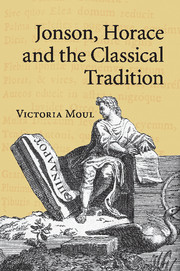Book contents
- Frontmatter
- Contents
- Acknowledgements
- List of abbreviations
- Introduction: imitation, allusion, translation: reading Jonson's Horace
- 1 Jonson's Odes: Horatian lyric presence and the dialogue with Pindar
- 2 Horatian libertas in Jonson's epigrams and epistles
- 3 Competing voices in Jonson's verse satire: Horace and Juvenal
- 4 Poetaster: classical translation and cultural authority
- 5 Translating Horace, translating Jonson
- Conclusion: More remov'd mysteries: Jonson's textual ‘occasions’
- Appendix: manuscript transcriptions
- Bibliography
- Index of passages discussed
- General index
2 - Horatian libertas in Jonson's epigrams and epistles
Published online by Cambridge University Press: 05 October 2010
- Frontmatter
- Contents
- Acknowledgements
- List of abbreviations
- Introduction: imitation, allusion, translation: reading Jonson's Horace
- 1 Jonson's Odes: Horatian lyric presence and the dialogue with Pindar
- 2 Horatian libertas in Jonson's epigrams and epistles
- 3 Competing voices in Jonson's verse satire: Horace and Juvenal
- 4 Poetaster: classical translation and cultural authority
- 5 Translating Horace, translating Jonson
- Conclusion: More remov'd mysteries: Jonson's textual ‘occasions’
- Appendix: manuscript transcriptions
- Bibliography
- Index of passages discussed
- General index
Summary
No simple word,
That shall be utter'd at our mirthfull boord,
Shall make us sad next morning: or affright
The libertie, that wee'll enjoy to night.
Epigrams 101, ‘Inviting a Friend to Supper’, 39–42 (closing lines)Although the commixture of Nations, confluence of Ambassadors, and the relation, which the affaires of Our Kingdomes have had towards the businesse and interests of forraine States, have caused, during Our Regiment, greater opennesse, and libertie of discourse, even concerning matters of State, (which are no Theames, or subjects fit for vulgar persons, or common meetings) then hath been in former times, used or permitted; And although in Our owne Nature, and Judgement, Wee doe well allow of convenient freedome of speech … Yet neverthelesse, forasmuch as it is come to Our eares, by common report, That there is at this time a more licentious passage of lavish discourse, and bold Censure in matters of State, then hath been heretofore, or is fit to be suffered, Wee have thought it necessary, by the advice of Our Privie Councell, to give forewarning unto Our loving Subjects, of this excesse and resumption …
[A Proclamation against excesse of Lavish and Licentious Speech of matters of State (Whitehall, 24 December 1620).]Epigram 101, ‘Inviting a Friend to Supper’, is one of Jonson's best-known and most anthologised poems. This lovely invitation piece was – and remains – widely imitated (Thom Gunn's fine poem, ‘An Invitation’, is modelled upon it); and it is of course itself an imitation.
- Type
- Chapter
- Information
- Jonson, Horace and the Classical Tradition , pp. 54 - 93Publisher: Cambridge University PressPrint publication year: 2010



